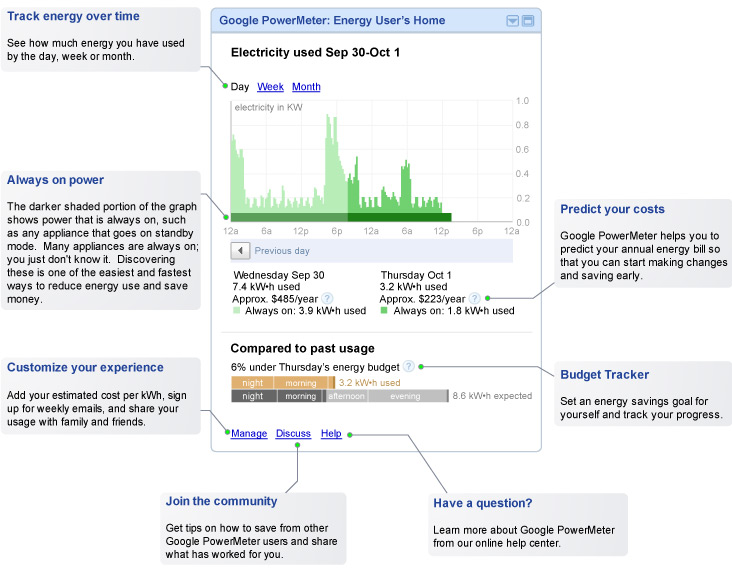
Photo courtesy of Google PowerMeter. Front page image: Wikimedia Commons
Like most people, I don’t have much information readily available about my power use. A bill containing information on my energy use during the previous month arrives via email every month, and I pay what it says I owe the utility. I have no idea what appliances suck the most power in my house, or how I could best reduce my overall consumption. But now Google wants to make sure everyone has more and better information about how much energy we use.
Google has already released a prototype PowerMeter, a web-based energy monitoring tool that provides real-time information about home usage. The company is also eyeing the market for other tech innovations that could help cut consumer energy use. But in order to work, their system and most others require smart grid technology like meters that can connect homes with their utilities. They also require information from power providers that would make it possible to use these meters.
Thus, Google and other high-tech companies are ramping up pressure on the government to ease access to the information and innovations that would expand use of these products. The company hosted a summit on access to energy information on Tuesday at its DC office, and joined 45 other major companies, venture capitalists, and environmental groups in calling on the Obama administration to “adopt the goal of giving every household and business access to timely, useful and actionable information on their energy use” in a letter. By giving energy users better information, they write, government can help “unleash the forces of innovation in homes and businesses.”
The groups list three top-line requests: “clear rules on consumer access to information; incentives to promote the deployment of technologies, including cost recovery; programs that educate and engage both providers and energy users; and encouragement of diverse technologies.”
The Obama administration last fall announced $3.4 billion in smart grid funding, and Energy Secretary Steven Chu is a big fan of the technology. White House energy and climate adviser Carol Browner endorsed the goals at Tuesday’s event. “Giving people this kind of real-time feedback will start to change not only their behavior, which is important,” said Browner. “But, equally important, it will start to drive the demand for more efficient appliances.”
It’s clear that Google and other tech companies see a lot of potential in improving access to energy information. I, for one, welcome our new energy conservation overlords, if it means we can get real time information sometime soon. Google’s entry into the space will be something to keep an eye on.











